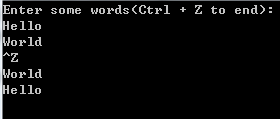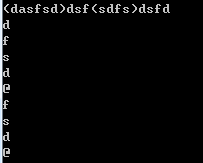C++容器适配器
一、标准库顺序容器适配器的种类 标准库提供了三种顺序容器适配器:queue(FIFO队列)、priority_queue(优先级队列)、stack(栈)二、什么是容器适配器 ”适配器是使一种事物的行为类似于另外一种事物行为的一种机制”,适配器对容器进行包装,使其表现出另外一种行为。例如,stack >实现了栈的功能,但其内部使用顺序容器vector来存储数据。(相当
·
一、标准库顺序容器适配器的种类
标准库提供了三种顺序容器适配器:queue(FIFO队列)、priority_queue(优先级队列)、stack(栈)
二、什么是容器适配器
”适配器是使一种事物的行为类似于另外一种事物行为的一种机制”,适配器对容器进行包装,使其表现出另外一种行为。例如,stack<int, vector<int> >实现了栈的功能,但其内部
使用顺序容器vector<int>来存储数据
。(相当于是vector<int>表现出了栈的行为)。
三、容器适配器
要使用适配器,需要加入一下头文件:
#include <stack>
//stack
#include<queue>
//queue、priority_queue
| 种类 | 默认顺序容器 | 可用顺序容器 | 说明 |
| stack | deque | vector、list、deque | |
| queue | deque | list、deque | 基础容器必须提供push_front()运算 |
| priority_queue | vector | vector、deque | 基础容器必须提供随机访问功能 |
四、定义适配器
1、初始化
stack<int> stk(dep);
2、覆盖默认容器类型
stack<int,vector<int> > stk;
五、容器适配器的使用
1、
下面的程序读入一系列单词存储在stack中,然后再显示输入的单词。
#include <iostream>
#include <stack>
#include <string>
using namespace std;
int main()
{
stack<string> words;
string str;
cout<<"Enter some words(Ctrl + Z to end):"<<endl;
while(cin >> str)
{
words.push(str);
}
while(words.empty() == false)
{
cout<<words.top()<<endl;
words.pop();
}
return 0;
}
2、使用stack处理带圆括号的表达式。遇到左括号时,将其标记下来。遇到右括号时,弹出stack中两括号之间的元素(包括括号),并压入一个"@"表示其已被替换。
#include <iostream>
#include <stack>
#include <string>
using namespace std;
int main()
{
stack<char> sta;
string str;
cin>>str;
string::iterator iter = str.begin();
while(iter != str.end())
{
if(*iter != ')')
sta.push(*iter);
else //*iter == ')'
{
while(sta.top() != '(' && !sta.empty())
{
sta.pop();
}
if (sta.empty())
{
cout<<"No '(' matched!"<<endl;
}
else //*iter == '('
{
sta.pop();
sta.push('@');
}
}
++iter;
}
while(!sta.empty())
{
cout<<sta.top()<<endl;
sta.pop();
}
return 0;
}
更多推荐
 已为社区贡献1条内容
已为社区贡献1条内容







所有评论(0)